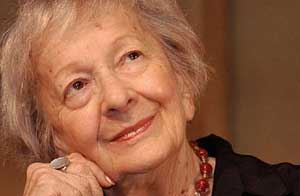
Wislawa Szymborska, Polish poet and translator, who was awarded the Nobel Prize for Literature in 1996, died yesterday evening, at the age of 89, at her home in the southern city of Krakow, her personal secretary Michal Rusinek said.
She frequently employed literary devices such as irony, paradox, contradiction, and understatement, to illuminate philosophical themes and obsessions. Her compact poems often conjure large existential puzzles, touching on issues of ethical import, and reflecting on the condition of people both as individuals and as members of human society.
While skepticism marked Szymborska’s views of the human condition, it did not stop her from believing in the power of words and the joy arising from imagination. She often used ordinary speech and proverbs but gave them a fresh and arresting meaning.
Szymborska was born in Bnin (now part of Kornik) in Western Poland in 1923. Since 1931 she was living in Krakow, where during 1945-1948 she studied Polish Literature and Sociology at the Jagiellonian University. Szymborska made her debut in March 1945 with a poem „Szukam slowa” (I am Looking for a Word) in the daily „Dziennik Polski”. During 1953-1981 she worked as poetry editor and columnist in the Krakow literary weekly „Zycie Literackie” Szymborska also translated French poetry.
Her work has been translated into many European languages, as well as into Arabic, Hebrew, Japanese and Chinese.
